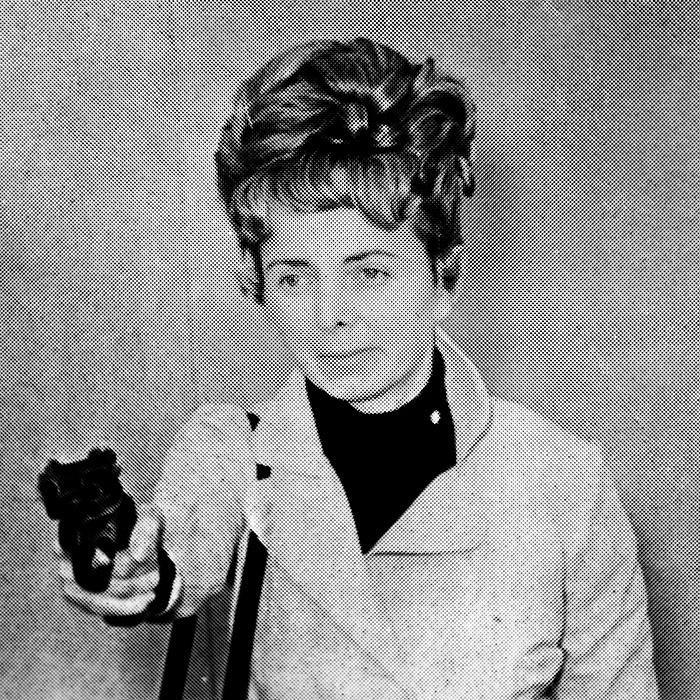Diplomatic Security Service: Early Days
The Diplomatic Security Service has collected a wealth of personal stories from Foreign Service specialists across the decades—and they are now available to the public.
The law enforcement and security arm of the U.S. Department of State, Diplomatic Security Service (DSS) personnel—like their fellow Foreign Service colleagues—have many stories to tell, having been present for major events that shaped not only the United States but the world. Yet, for many years, these stories remained untold. DSS was founded in 1916, when then–Secretary of State Robert Lansing created a State Department–led, international law enforcement task force to investigate ongoing German espionage and passport fraud. Over the ensuing years, DSS special agents, security engineering officers, security technical specialists, diplomatic couriers, Civil Service employees, contractors, and other personnel carried out the DSS mission, collecting stories of intrigue and adventure along the way.
A few personal remembrances were written over the years, but in 1991, to celebrate its 75th anniversary, the DSS Office of Public Affairs (DSS/PA) began to capture firsthand accounts from both current and retired personnel, creating a video archive that preserves these fascinating tales. Captured with digital voice recorders and VHS tapes, DSS officials recorded more than 20 oral histories, detailing events such as the discovery of bugs planted by Soviet spies in the 1970s and 1980s, the effect the 1968 Tet Offensive had on the U.S. embassy in Vietnam, and the role of diplomatic couriers in escorting classified cargo across Africa in the 1960s.
The effort to capture oral histories waned over the next couple of decades. But in 2015, when the organization began planning activities to recognize its centennial, DSS/PA staff once again began interviewing individuals and archiving their stories.
Shortly thereafter, DSS/PA began systematically archiving and preserving boxes and boxes of VHS tapes, audio files, DVDs, and other files. As public affairs officers viewed these interviews, they realized DSS had decades of history, experience, and stories that ought to be shared with the American people.
The complete archive is available at https://bit.ly/DSS_from-the-archives. Below are a few excerpts from those who witnessed history.
—Angela French

Robert C. Bannerman led the Office of the Chief Special Agent, the DSS predecessor organization at the U.S. Department of State, from 1920 to 1940. Bannerman expanded the Office of the Chief Special Agent’s duties to include many tasks still held by the Bureau of Diplomatic Security today: background investigations, passport fraud, oversight of couriers, protection of foreign dignitaries, and internal investigations.
Bureau of Diplomatic Security

Robert L. Bannerman was director of the Security Office, a DSS predecessor organization at the U.S. Department of State, from 1945 to 1947. As a special agent he conducted hundreds of passport fraud and counterintelligence investigations and identified several high-profile incidents of German espionage. In 1941 Special Agent Bannerman coordinated the detention of more than 1,000 Axis diplomats until U.S. officials could negotiate an exchange with the Axis powers.
Bureau of Diplomatic Security
There at the Beginning
My father [Robert C. Bannerman] was one of the original agents in the establishment of the Office of Security [which later became the Diplomatic Security Service]. … He was engaged in many special activities, covering, you might say, foreign agents working in the United States against the United States and against the German cause; British agents checking on German activity in the United States [focused on] trying to convince President [Woodrow] Wilson to stay in his neutral position. These and a number of other things were taking place, all highly sensitive.
In February 1916, Secretary [Robert] Lansing directed the chief special agent and his staff to establish a tap on the German embassy [in Washington, D.C.] to get all possible information within the embassy, and outgoing and incoming calls. This was accomplished by the chief special agent’s office, in which my father was playing an important part. The taps were monitored, and daily, a report was written and placed on the desk of Secretary Lansing of the most important events over the tap for the past 24 hours.
I am sure that Secretary Lansing passed this information on to President Wilson. He gave him an added element of information that he could not have obtained in any other way. I feel that in some small way, it may have convinced Wilson that the German overtures toward peace were unfounded, and not sincere.
This led the president to go ahead and declare war on Germany in April 1917.
… I didn’t enter [the Office of Security] until about 1936. But at that point, there were only about four of us, and we covered the whole United States. In this period—I call it the period of growth—we were growing in our responsibilities, but the other agencies were not.
—Special Agent Robert L. Bannerman, active duty from 1936 to 1947, recorded in 1991.
Crossing European Borders After the War
Most memorable trip? Perhaps making the first trip into Switzerland, in 1944, after Paris was liberated. The border of Switzerland had been sealed off for four years, and I had just been assigned to the embassy in Paris to start a courier service there, three weeks after it was liberated.
Our transportation, Jeeps, came from SHAEF [Supreme Headquarters Allied Expeditionary Force], General [Dwight] Eisenhower’s headquarters. Gave me a Jeep and another Jeep with a couple of soldiers in it. We traveled across France to the Swiss border; we were the first Americans that the Swiss had seen for four years. They had a wonderful time with our passports [and] visas. They finally let me in. The two soldiers stayed at the border.
I took a train up to Bern. Allen Dulles, John Foster Dulles’ brother, was head of the OSS (Office of Strategic Services) there. And he was highly interested, of course, that there was the beginning of a courier service into Switzerland which he had great use for.
—Diplomatic Courier Robert Clark, active duty from 1941 until the early 1960s (est.), recorded in 1991.
First Female Agent in Wartime Vietnam

Special Agent Patricia “Patti” Morton, who became the first female special agent in 1972, during target practice in the 1970s.
Bureau of Diplomatic Security
Within 20 months of coming on board [as a DSS special agent], I was told by telephone one day that I had been reassigned and would become the first female RSO [regional security officer] in Vietnam, which was, of course, at war. Anyone who wanted, at that time, could refuse an assignment to Vietnam and was told it would not go against their career. I, however, never even considered that option and said, “Yes, I will go.”
I arrived there in March or April of 1974. My immediate situation was being one of four RSOs. … I was put in charge of the main security guard company, following their daily activities. I also was to physically survey all our consulates, which were throughout Vietnam.
One of the major areas people considered women would have a problem in would be handling Marine security guards [MSGs]. In fact, even before going to Vietnam, when I was out at the graduation class mess night, Saigon-bound MSGs told me that they felt they deserved to have the first woman security officer since they were the largest Marine company in the program.
The Marine security guards were also impressed with my ability with weapons. When I would go out to the training fields such as the Vietnam military shooting site, I was able to hit, even with the bazookas and the larger weapons, things that they had not been able to zero in on in the various times they had gone out shooting. So that also helped in that I had their respect.
—Special Agent Patricia “Patti” Morton, active duty from 1972 until the late 1990s (est.), recorded in 1991.

Security Engineering Officer John Bainbridge in 1978, searching for Soviet listening devices in a chimney at the U.S. embassy in Moscow after recovering an antennae system hidden there by the Soviets.
Bureau of Diplomatic Security
Soviet Bugs
When I look back on my career of 34 years in DS, I reflect on my first inspection trip to Moscow, when we found the [Russian KGB “bugging”] attack against our typewriters. That was 1978, and no one understood until 1984, when they collectively examined the office equipment and stumbled across [the listening devices].
Over six years they had actually gotten into 16 of our typewriters, three in Leningrad and 13 in Moscow. They couldn’t control where those typewriters went in our building, so they bugged as many as they could. And we didn’t understand it for six years. I fear that at some point in time after our initial discovery they must have realized that they could turn [the listening devices] back on. So, yeah, there was my first encounter with the Russian KGB.
And then the second memory, obviously, was when we had to take a brand-new embassy apart. That’s kind of a unique distinction to have. It cost us dearly in terms of time and in terms of dollars. I was part of that project for a period of years. And then, when I was the ST [security technology] director, we discovered that they had actually gotten into the Harry S Truman building and pulled off an attack. I went down the hall to Peter Bergen, [who] at the time was our principal DAS [deputy assistant secretary], and I said, “Pete, we need to start inspecting the building.”
Ever since that day and that time, we’ve had inspection teams go through the building routinely. We have a whole program for that now. Because if anyone goes into a wiring closet and starts looking at the nest of the fiber cables running hither and yon, one realizes how easy it would be if you had access to that. Why would you attack U.S. missions overseas if you already had their headquarters building?
That put the fear of God in me, and Pete agreed. We immediately started assembling teams, and we’ve been going through the building routinely ever since.
—Security Engineering Officer John Bainbridge, active duty from the 1970s through the 2000s (est.), recorded in 2015.
101 Recommendations for Change

Robert Clark, who became a diplomatic courier in 1944.
Bureau of Diplomatic Security
I came into the [Administration] Bureau in late 1983. Tom Tracy was my predecessor. He was the assistant secretary for administration. … Tom said, “Bob, we had an embassy blown up in Beirut in March.” He added: “There are going to be more embassies blown up.”
And Tom was right. I was in the job a very short period of time when the embassy in Kuwait [was] blown up [by terrorists]. We could see vulnerabilities. The Secretary of State, George Shultz, asked me one morning, “Bob, how many other places do we have like Kuwait that could be blown up?” And I said, “Sir, we’ve looked at that in security, and we think we’ve got 13 to 15 embassies that could be blown up today. We do not have adequate security for our embassies.” And the word from the Secretary and the White House was: “Stop it. Make sure it doesn’t happen again.”
We created a whole range of measures. Probably the most important social change that has happened in the Department of State since the Second World War was the creation of the Bureau of Diplomatic Security. It was an enormous task to get the department to recognize that its mission was much broader than simply the transmission of diplomatic messages, but in fact [included] the protection of data and the protection of people who are doing our country’s work abroad.
It was an exciting time. We got a lot of outside help and the most important single element in that outside help was a panel that was chaired by Admiral Bobby Inman, a former number two at the CIA, former head of the National Security Agency, and a smart man. Admiral Inman looked at the whole range of functions of the Department of State and how they needed to be changed, what we needed to do better, and he prescribed, I think it was, 101 recommendations. Incredibly, virtually the entire list of 101 were ultimately done. I know of very few government panels that had so many of their recommendations accepted by the agency, and these were far-reaching recommendations.
—Assistant Secretary for the Bureau of Diplomatic Security (1986-1989) Robert E. Lamb, recorded in the summer of 1991.
This is just a small sample of the impressive work that is still performed by the Diplomatic Security Service today. DSS/PA continues to interview its personnel and publish oral histories on its YouTube channel and via its After Action podcast.
When sharing or linking to FSJ articles online, which we welcome and encourage, please be sure to cite the magazine (The Foreign Service Journal) and the month and year of publication. Please check the permissions page for further details.
Read More...
- “DS at 100: A Tradition of Vigilance” by Bill A. Miller, The Foreign Service Journal, March 2017
- “Securing Diplomacy for the Next Quarter Century” by Gregory B. Starr, The Foreign Service Journal, March 2017
- “None Swifter Than These” by James B. Angell, The Foreign Service Journal, November 2018






